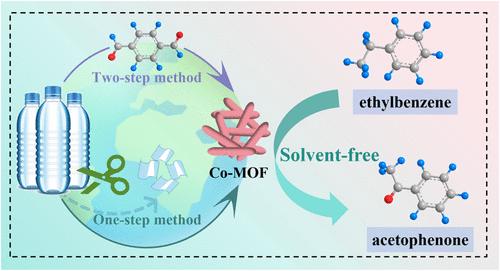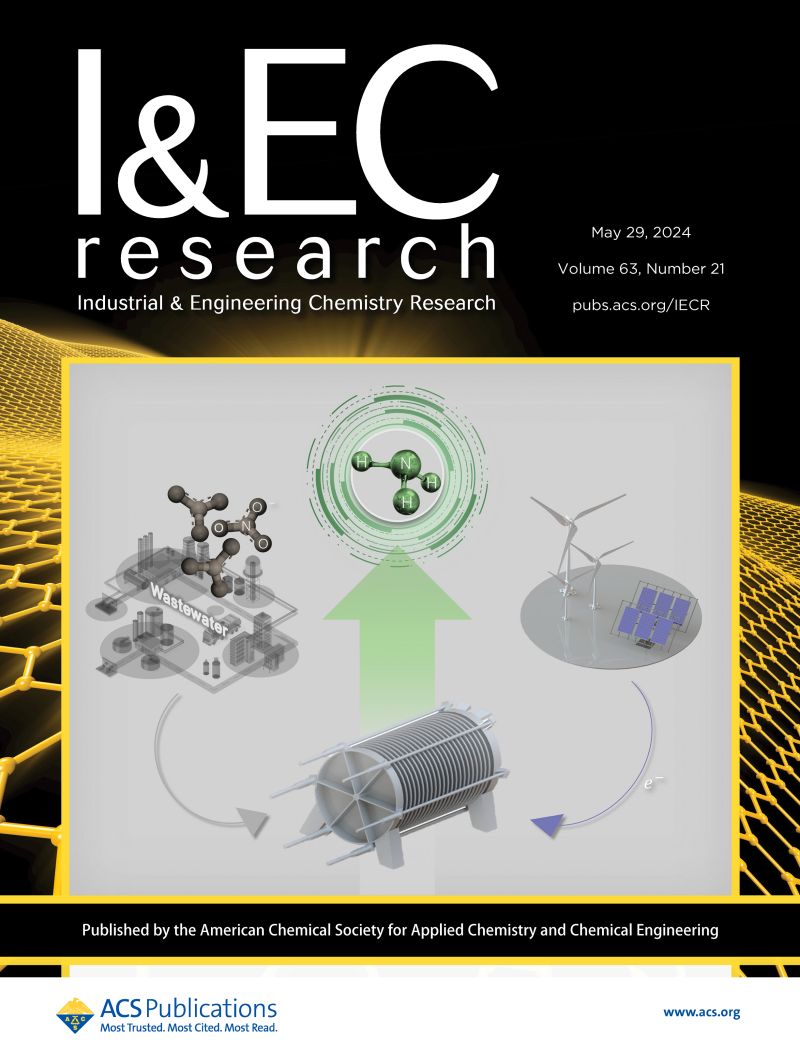废PET合成Co-MOF高效选择性催化氧化乙苯
IF 3.9
3区 工程技术
Q2 ENGINEERING, CHEMICAL
引用次数: 0
摘要
通过化学回收将废旧PET升级为金属有机骨架(MOF),为PET回收处理和高附加值转化提供了新的思路和方法。以PET为原料,采用一锅溶剂热法制备了钴基金属有机骨架(Co-MOF)。制备的Co-MOF作为非均相催化剂,催化乙苯(EB)选择性氧化制备苯乙酮(AP)。以过氧化叔丁基(TBHP)为氧化剂,不添加任何溶剂,EB转化率为89%,AP选择性为94%。此外,该催化剂在5次循环中没有明显失活,表现出良好的稳定性。此外,合成的Co-MOF-10在苯甲醇和苯乙烯氧化反应中分别表现出96%和93%的转化率。与商用对苯二甲酸(BDC)制备的Co-MOF相比,PET一锅法合成的Co-MOF-10具有更高的成本效益、环境可持续性和更好的催化性能。本研究为塑料PET转化为有价值的MOF及其在C-H键氧化中的后续应用奠定了基础。本文章由计算机程序翻译,如有差异,请以英文原文为准。

Efficient and Selective Catalytic Oxidation of Ethylbenzene over Co-MOF Synthesized from Waste PET
Upgrading waste PET to prepare metal–organic frameworks (MOF) through chemical recycling provides new ideas and methods for PET recycling treatment and high value-added conversion. In this paper, Cobalt-based metal–organic frameworks (Co-MOF) were prepared from PET by one-pot solvothermal method without adding acids or bases. The prepared Co-MOF was used as a heterogeneous catalyst to catalyze the selective oxidation of ethylbenzene (EB) for the preparation of acetophenone (AP). When only tert-butyl hydroperoxide (TBHP) was used as the oxidizing agent without any additional solvents, 89% EB conversion and 94% AP selectivity were achieved, respectively. Moreover, the catalyst showed excellent stability with no significant deactivation under 5 cycles. In addition, the synthesized Co-MOF-10 also exhibits impressive conversion rates of 96% and 93% in benzyl alcohol and styrene oxidation, respectively. Compared with the Co-MOF prepared by commercial terephthalic acid (BDC), the Co-MOF-10 synthesized via the one-pot method using PET exhibits enhanced cost-effectiveness, environmental sustainability, and superior catalytic performance. The present study establishes a foundation for the conversion of plastic PET into valuable MOF and its subsequent application in C–H bond oxidation.
求助全文
通过发布文献求助,成功后即可免费获取论文全文。
去求助
来源期刊

Industrial & Engineering Chemistry Research
工程技术-工程:化工
CiteScore
7.40
自引率
7.10%
发文量
1467
审稿时长
2.8 months
期刊介绍:
ndustrial & Engineering Chemistry, with variations in title and format, has been published since 1909 by the American Chemical Society. Industrial & Engineering Chemistry Research is a weekly publication that reports industrial and academic research in the broad fields of applied chemistry and chemical engineering with special focus on fundamentals, processes, and products.
 求助内容:
求助内容: 应助结果提醒方式:
应助结果提醒方式:


